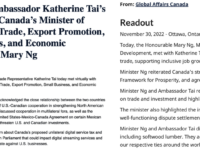Canadian International Trade Minister Mary Ng and U.S. Trade Representative Katherine Tai met yesterday to discuss Canada-U.S. Trade issues and concerns regarding Canada’s digital policy – most notably a proposed digital sales tax and Bills C-11 and C-18 – continue to mount. The U.S. raised digital policy concern over the summer, specifically citing Bill C-11 with a reference to “pending legislation in the Canadian Parliament that could impact digital streaming services.” The latest readout suggests that the concerns are growing, as the U.S. now cites both Bills C-11 and C-18 by raising “pending legislation in the Canadian Parliament that could impact digital streaming services and online news sharing and discriminate against U.S. businesses.”
Post Tagged with: "berne convention"
Freedom of Expression for a Price: Government Confirms Bill C-18 Requires Platform Payment for User Posts That Include News Quotes and Hyperlinks
The longstanding debate over whether Bill C-18, the Online News Act, requires payment for linking came to an end yesterday. Government officials admitted that even basic quotes from news articles that include a hyperlink to the original source would scope user posts into the law and require platforms such as Google and Facebook to negotiate payment for the links. As noted below, even that position may understate the impact of the bill, which appears to also cover a user post of a news quote without a link. In other words, merely quoting a few sentences from a news article on an Internet platform is treated as making news content available, which triggers a requirement for the platforms to negotiate payment. This position runs counter to Canada’s copyright obligations under the Berne Convention and has no place in a country committed to freedom of expression.
Why the Online News Act is a Bad Solution to a Real Problem, Part Four: Undermining Canadian Copyright Law and International Copyright Treaty Obligations
The series on why Bill C-18, the Online News Act, is a bad solution in search of a real problem has thus far focused on three issues: the risk to the free flow of information stemming from mandatory compensation for linking, how the bill encourages clickbait and other low quality news given the absence of standards in the definition of “news content”, and the unprecedented government intervention in a sector where independence is essential. Today’s post raises an unlikely issue given that Bill C-18 is the responsibility of Canadian Heritage Minister Pablo Rodriguez, who also has part responsibility for copyright law in Canada. Buried within the bill is Section 24, a short provision with big copyright implications:
For greater certainty, limitations and exceptions to copyright under the Copyright Act do not limit the scope of the bargaining process.
What does this mean and why is it in the bill?









